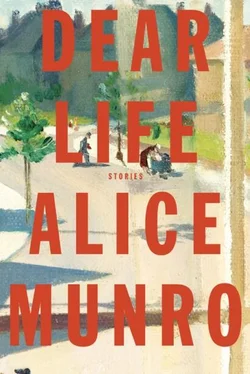She had brought one of her girls with her.
“Maybe just felt like an outing,” my father said. “Maybe just likes to dance.”
My mother seemed not even to have heard this. She said that it was a shame. You expected to have a nice time, a nice decent dance within a neighborhood, and then it was all ruined.
I was in the habit of assessing the looks of older girls. I had not thought Peggy was particularly pretty. Maybe her makeup had rubbed off with her crying. Her rolled up mousey-colored hair had got loose from some of its bobby pins. Her fingernails were polished but they still looked as if she chewed them. She didn’t seem much more grown up than one of those whiny, sneaky, perpetually complaining older girls I knew. Nevertheless the young men treated her as if she was someone who deserved never to have encountered one rough moment, someone who rightfully should be petted and pleasured and have heads bowed before her.
One of them offered her a ready-made cigarette. This in itself I saw as a treat, since my father rolled his own and so did every other man I knew. But Peggy shook her head and complained in that hurt voice that she did not smoke. Then the other man offered a stick of gum, and she accepted it.
What was going on? I had no way of knowing. The boy who had offered the gum noticed me, while rummaging in his pocket, and he said, “Peggy? Peggy, here’s a little girl I think wants to go upstairs.”
She dropped her head so I couldn’t look into her face. I smelled perfume as I went by. I smelled their cigarettes too and their manly woolen uniforms, their polished boots.
When I came downstairs with my coat on they were still there, but this time they had been expecting me, so they all kept quiet while I passed. Except that Peggy gave one loud sniffle, and the young man nearest to her kept stroking her upper leg. Her skirt was pulled up and I saw the fastener holding her stocking.
For a long time I remembered the voices. I pondered over the voices. Not Peggy’s. The men’s. I know now that some of the Air Force men stationed at Port Albert early in the war had come out from England, and were training there to fight the Germans. So I wonder if it was the accent of some part of Britain that I was finding so mild and entrancing. It was certainly true that I had never in my life heard a man speak in that way, treating a woman as if she was so fine and valued a creature that whatever it was, whatever unkindness had come near her, was somehow a breach of a law, a sin.
What did I think had happened to make Peggy cry? The question did not much interest me at the time. I was not a brave person myself. I cried when chased and beaten with shingles on the way home from my first school. I cried when the teacher in the town school singled me out, in front of the class, to expose the shocking untidiness of my desk. And when she phoned my mother about the same problem and my mother hanging up the phone herself wept, enduring misery because I was not a credit to her. It seemed as though some people were naturally brave and others weren’t. Somebody must have said something to Peggy, and there she was snuffling, because like me she was not thick-skinned.
It must have been that orange-dressed woman who had been mean, I thought, for no particular reason. It had to have been a woman. Because if it had been a man, one of her Air Force comforters would have punished him. Told him to watch his mouth, maybe dragged him outside and beaten him up.
So it wasn’t Peggy I was interested in, not her tears, her crumpled looks. She reminded me too much of myself. It was her comforters I marvelled at. How they seemed to bow down and declare themselves in front of her.
What had they been saying? Nothing in particular. All right, they said. It’s all right, Peggy, they said. Now, Peggy. All right. All right.
Such kindness. That anybody could be so kind.
It is true that these young men, brought to our country to train for bombing missions on which so many of them would be killed, might have been speaking in the normal accents of Cornwall or Kent or Hull or Scotland. But to me they seemed to be unable to open their mouths without uttering some kind of blessing, a blessing on the moment. It didn’t occur to me that their futures were all bound up with disaster, or that their ordinary lives had flown out the window and been smashed on the ground. I just thought of the blessing, how wonderful to get on the receiving end of it, how strangely lucky and undeserving was that Peggy.
And, for I don’t know how long, I thought of them. In the cold dark of my bedroom they rocked me to sleep. I could turn them on, summon up their faces and their voices—but oh, far more, their voices were now directed to myself and not to any unnecessary third party. Their hands blessed my own skinny thighs and their voices assured me that I, too, was worthy of love.
And while they still inhabited my not yet quite erotic fantasies they were gone. Some, many, gone for good.
I LIVED when I was young at the end of a long road, or a road that seemed long to me. Back behind me, as I walked home from primary school, and then from high school, was the real town with its activity and its sidewalks and its streetlights for after dark. Marking the end of town were two bridges over the Maitland River: one narrow iron bridge, where cars sometimes got into trouble over which one should pull off and wait for the other, and a wooden walkway which occasionally had a plank missing, so that you could look right down into the bright, hurrying water. I liked that, but somebody always came and replaced the plank eventually.
Then there was a slight hollow, a couple of rickety houses that got flooded every spring, but that people—different people—always came and lived in anyway. And then another bridge, over the mill race, which was narrow but deep enough to drown you. After that, the road divided, one part of it going south up a hill and over the river again to become a genuine highway, and the other jogging around the old fairgrounds to turn west.
That westward road was mine.
There was also a road heading north, which had a brief but real sidewalk and several houses close together, as if they were in town. One of them had a sign in the window that said “Salada Tea,” evidence that groceries had once been for sale there. Then there was a school, which I had attended for two years of my life and wished never to see again. After those years, my mother had made my father buy an old shed in town so that he would be paying town taxes and I could go to the town school. As it turned out, she hadn’t needed to do that, because in the year, in the very month, that I started school in town, war was declared with Germany and, as if by magic, the old school, the school where bullies had taken away my lunch and threatened to beat me up and where nobody seemed to learn anything in the midst of the uproar, had quieted down. Soon it had only one room and one teacher, who probably did not even lock the doors at recess. It appeared that the same boys who’d always asked me rhetorically and alarmingly if I wanted to fuck were just as eager to get jobs as their older brothers were to go into the Army.
I don’t know if the school toilets had improved by then or not, but they had been the worst thing. It was not as if we didn’t resort to an outhouse at home, but it was clean and even had a linoleum floor. At that school, for reasons of contempt or whatever, nobody seemed to bother to aim for the hole. In many ways it wasn’t easy for me in town, either, because everybody else had been together since grade one, and there were many things that I hadn’t learned yet, but it was a comfort to see my new school’s unsoiled seats and to hear the noble urban sound of its flush toilets.
Читать дальше












